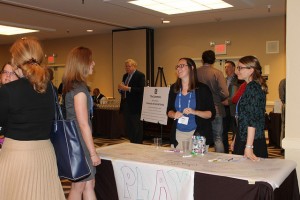2016 NCPH/SHFG joint conference topic proposals
04 June 2015 – editors
Last year, the National Council on Public History decided to pilot an optional topic proposal deadline for annual meeting session, workshop, and working group submissions (see last year’s announcement here), and it was a success. Of the 55 topic submissions received last year, 42 were resubmitted as full proposals, and 20 of those were accepted onto the program. This is incredible given the stiff competition last year (only 69 of 157 proposals were accepted). For the 2014 annual meeting, NCPH saw a 40% increase in proposals over any other year; and for 2015, we saw an increase of 26% over that! Based on the attendance increase in Nashville, and because the 2016 meeting is a joint conference with the Society for History in the Federal Government (SHFG), there will be an increase in the total number of sessions and working groups accepted onto the Program, but competition will still be considerable.
We hope that the topic proposal option will connect people interested in similar ideas and themes early in the process. The joint program committee will continue to accept individual paper submissions, but we hope that presenters who have great ideas and a project to present will use the topic proposal to meet like-minded people interested in joining forces and, subsequently, submit a proposal for a panel or other complete session format.
We also hope that the topic proposal will give people new to NCPH and SHFG meetings an opportunity to get feedback in time to revise and refine their proposals before submitting a final version and to find co-presenters doing similar work. By nurturing these new voices, we can strengthen the conference program and learn about emerging projects, research, and perspectives. We also hope to see sessions that include presenters representing both NCPH and SHFG.
What happens next and how can I participate?
The deadline for the topic proposals was June 1. Each proposal includes a working title, abstract, description of the types of assistance the proposer is looking for, key words for the topics the proposal relates to, and contact information for the proposer. Click here to get to a list of each of the 40 topic proposals we received.
If you have a direct offer of assistance, sensitive criticism, or wish to share contact information for other people the proposer should reach out to, please get in contact with the proposer directly through the link to his/her email. If you have general ideas or feedback to share, please use the comments feature at the end of the individual proposal’s page (links to each proposal submission can be found on the listing page). Feedback must be submitted by Friday, July 3.
After receiving feedback, the original proposer can choose to flesh out the proposal and submit the completed version using the full session or workshop proposal form online by July 15. All full proposals received through the system by the July 15 deadline will be reviewed by the joint NCPH/SHFG Program Committee, and proposers will be notified by September 15 if they have been accepted onto the program for Baltimore.
Advice for commenters and proposers
As you follow the links below, you’ll see that proposers are interested in a wide variety of topics—from immigration and public history and human rights archives to children’s museums and women in civil rights narratives. The proposers represent the range of people engaged in public history, including practitioners, students, and faculty, including many who are new to the field.
Commenters and proposers should keep the following in mind:
- Try to respond to what the proposers are looking for. Some are looking for help focusing their topics while others are looking for advice or co-presenters.
- We hope that proposers and commenters think about the best way to convey information and provoke engagement. Keep in mind the NCPH’s advice to conference presenters and avoid “panels of talking heads and over-reliance on PowerPoint presentations.”
- As the theme “challenging the exclusive past” implies, we are looking for panels that raise new questions, highlight problematic issues, and place projects in a larger context. Try to avoid the “show and tell” approach and don’t be afraid to discuss the implications of your work (success and failures) for public history.
- Remember that the program committee ultimately will only be able to accept a limited number of sessions, so collaboration is the key to get as much diversity in the program as possible.
~ Stephanie Rowe, NCPH Interim Executive Director
~ Gregory Smoak, 2016 Annual Meeting Program Chair
~ Carl Ashley, 2016 Annual Meeting Program Co-Chair
——
List of Proposals – Please provide comments on proposals by July 3, 2015





1 comment